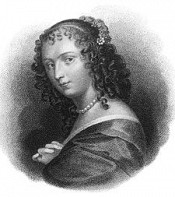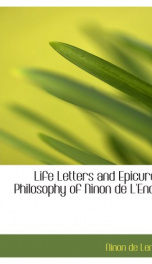Lenclos Ninon de

Anne "Ninon" de l'Enclos also spelled Ninon de Lenclos and Ninon de Lanclos (10 November 1620 – 17 October 1705) was a French author, courtesan and patron of the arts.[1] From her beginnings as an orphaned simple prostitute, then a paid mistress, she redefined herself as she acquired financial independence, adding philosophical weight to her life as an independent, thinking libertine.[2] At the time of her death, in 1705, Saint-Simon primly summed up her career: "A shining example of the triumph of vice, when directed with intelligence and redeemed by a little virtue." Born Anne de Lenclos in Paris, she was nicknamed "Ninon" by her father at an early age. In 1632 her father was exiled from France after a duel, and when her mother died ten years later the unmarried Ninon entered a convent only to leave the next year. Based on the remainder of her life, the choice of a convent would seem surprising, but it was really only an aspect of the clear idea that drove her actions: she was determined to remain unmarried and independent. Influenced by Epicureanism in general and Montaigne in particular, she devoted her life to pleasure, both physical and mental. Returning to Paris, she became a popular figure in the salons, and her own drawing room became a centre for the discussion and consumption of the literary arts. In her early thirties she was responsible for encouraging the young Molière, and when she died she left money for the son of her accountant, a nine-year old named François Marie Arouet, later to become better known as Voltaire, so he could buy books. It was during this period that her life as a courtesan began. Ninon took a succession of notable and wealthy lovers, including the king's cousin the Great Condé, Gaston de Coligny, and François, duc de La Rochefoucauld. "Ninon always had crowds of adorers but never more than one lover at a time, and when she tired of the present occupier, she said so frankly and took another. Yet such was the authority of this wanton, that no man dared fall out with his successful rival; he was only too happy to be allowed to visit as a familiar friend," Saint-Simon wrote. This life (not as acceptable in those days as it would become in later years) and her opinions on organized religion caused her some trouble, and she was imprisoned in the Madelonnettes Convent in 1656 at the behest of Anne of Austria, Queen of France and regent for her son Louis XIV. Not long after, however, she was visited by Christina, former queen of Sweden. Impressed, Christina wrote to Cardinal Mazarin on Ninon's behalf and arranged for her release. In response, as an author she defended the possibility of living a good life in the absence of religion, notably in 1659's La coquette vengée ("The Flirt Avenged"). She was also noted for her wit; among her numerous sayings and quips are "Much more genius is needed to make love than to command armies" and "We should take care to lay in a stock of provisions, but not of pleasures: these should be gathered day by day." A picture of Ninon, under the name of Damo, was sketched in Mlle de Scudéry's Clélie (1654-1660).[3] Starting in the late 1660s she retired from her courtesan lifestyle and concentrated more on her literary friends — from 1667, she hosted her gatherings at l'hôtel Sagonne, which was considered "the" location of the salon of Ninon de l'Enclos despite other locales in the past. During this time she was a friend of Jean Racine, the great French playwright. Later she would become a close friend with the devout Françoise d'Aubigné, better known as Madame de Maintenon, the lady-in-waiting who would later become the second wife of Louis XIV. "The lady did not like her to be mentioned in her presence, but dared not disown her, and wrote cordial letters to her from time to time, to the day of her death" (Saint-Simon). Ninon eventually died at the age of (at least) 82, a very wealthy woman. At one point in her life, Cardinal Richelieu offered fifty thousand crowns for a night in his bed. Ninon took the money, and sent a friend instead. "Ninon made friends among the great in every walk of life, had wit and intelligence enough to keep them, and, what is more, to keep them friendly with one another." (Saint-Simon). Ninon de l'Enclos is a relatively obscure figure in the English-speaking world, but is much better known in France where her name is synonymous with wit and beauty. See Dorothy Parker's poem Ninon De Lenclos, On Her Last Birthday.
do you like this author?
What readers are saying
What do you think? Write your own comment on this book!
write a commentWhat readers are saying
What do you think? Write your own comment on this author!
write a commentBook list

Life,Letters,and Epicurean Philosophy of Ninon de L'Enclos
The Celebrated Beauty of the Seventeenth Century
Series:
Unknown
Year:
Unknown
Raiting:
5/5
Show more
add to favoritesadd In favorites

Life, Letters, and Epicurean Philosophy of Ninon de L'Enclos
Series:
Unknown
Year:
Unknown
Raiting:
3/5
The inner life of the most remarkable woman that ever lived is here presented to American readers for the first time. Ninon or Mademoiselle de l¿Enclos as she was known was the most beautiful woman of the seventeenth century.
Show more
add to favoritesadd In favorites
Book list

Life,Letters,and Epicurean Philosophy of Ninon de L'Enclos
The Celebrated Beauty of the Seventeenth Century
Series:
Unknown
Year:
Unknown
Raiting:
5/5
Show more
add to favoritesadd In favorites

Life, Letters, and Epicurean Philosophy of Ninon de L'Enclos
Series:
Unknown
Year:
Unknown
Raiting:
3/5
The inner life of the most remarkable woman that ever lived is here presented to American readers for the first time. Ninon or Mademoiselle de l¿Enclos as she was known was the most beautiful woman of the seventeenth century.
Show more
add to favoritesadd In favorites
What readers are saying
What do you think? Write your own comment on this author!
write a commentif you like Lenclos Ninon de try:
readers also enjoyed
What readers are saying
What do you think? Write your own comment on this author!
write a commentif you like Lenclos Ninon de try:
readers also enjoyed
Do you want to read a book that interests you? It’s EASY!
Create an account and send a request for reading to other users on the Webpage of the book!

